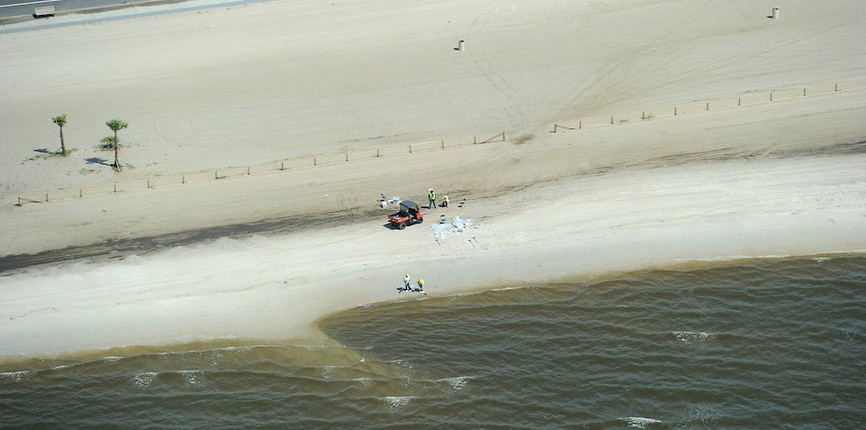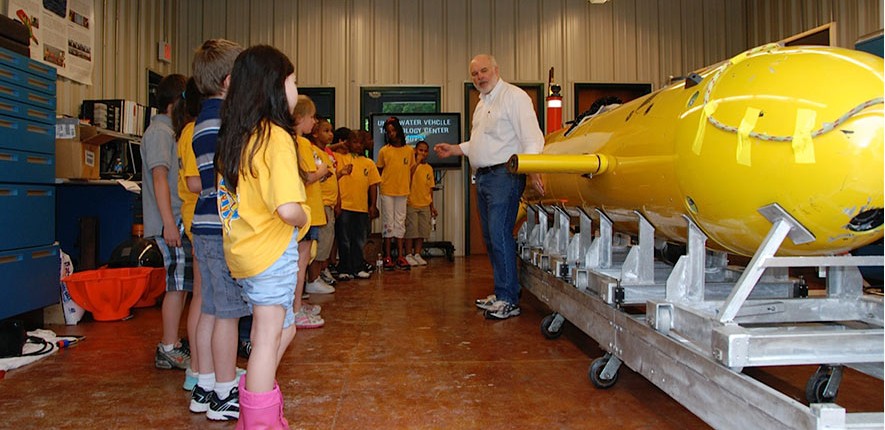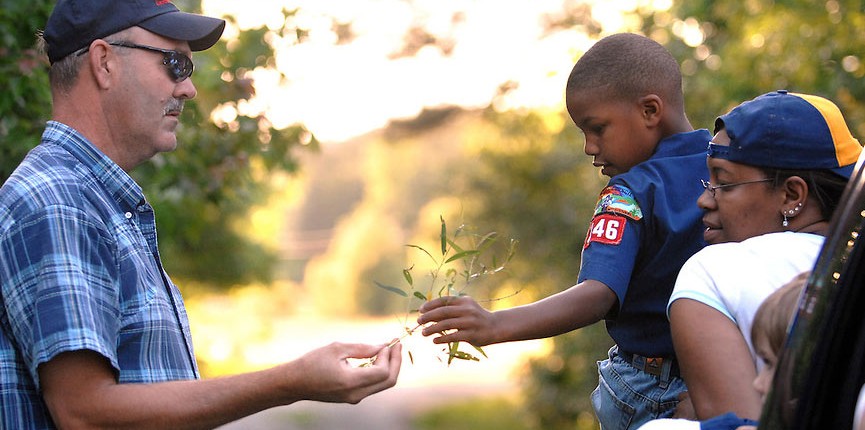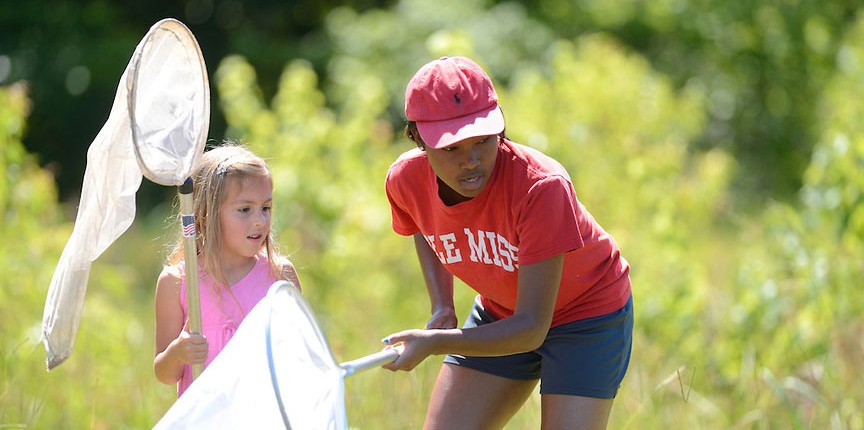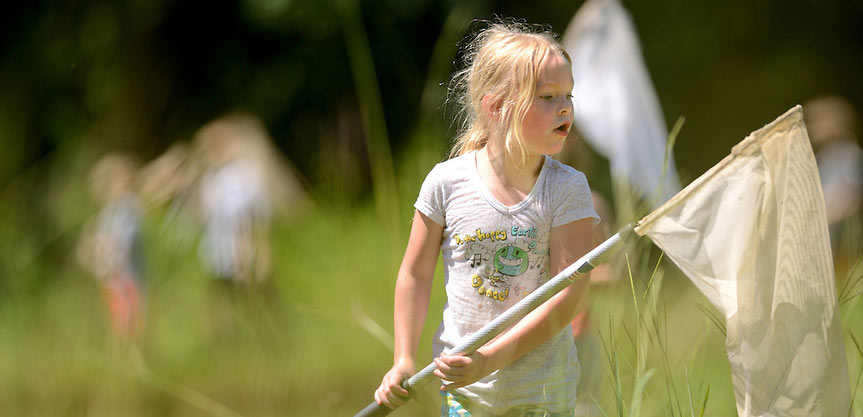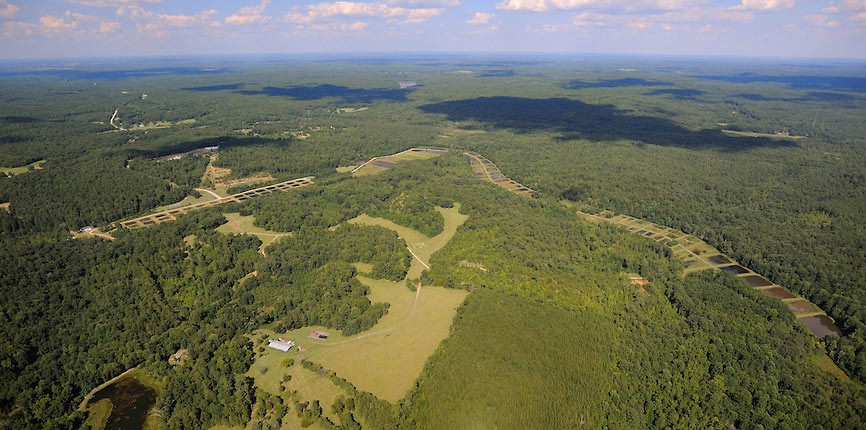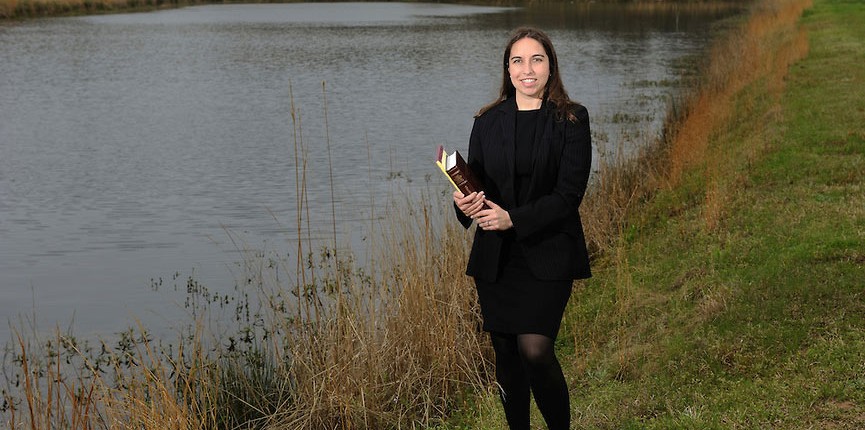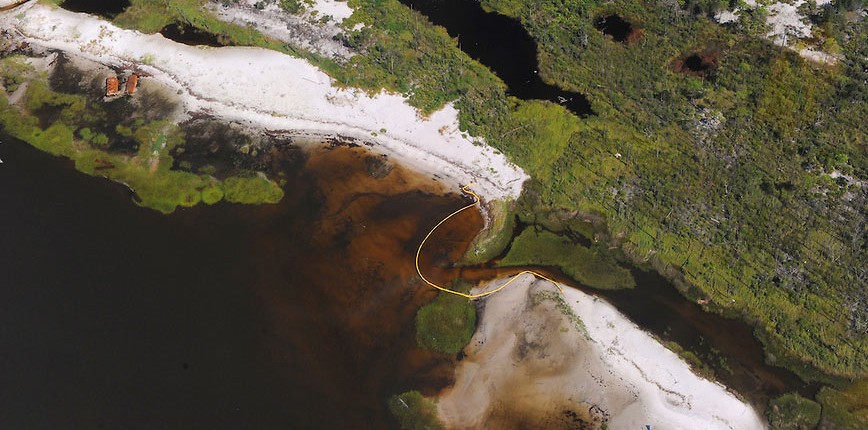

In April 2010, the explosion of the Deepwater Horizon oil rig spread almost 5 million barrels of oil into the Gulf of Mexico, creating an environmental disaster of a magnitude never before seen. Three hundred miles from the coast, researchers at the University of Mississippi stood ready to offer their service and expertise. These are the stories of three UM researchers who led the way in studying the environmental and social repercussions of the Deepwater Horizon Oil spill.
Environmental Effects

Ray Highsmith
With 300 miles separating Oxford and the Gulf of Mexico, it may seem surprising that the University of Mississippi is home to nationally recognized ocean scientists. But in fact, the university has become a leader in deep-water research thanks to the National Institute for Undersea Science and Technology, an institute based jointly at UM and the University of Southern Mississippi and supported by the National Oceanic and Atmospheric Administration.
NIUST’s establishment in 2002 laid the groundwork for a host of research programs and led marine scientist Raymond C. Highsmith, an expert in gas hydrates and seabed oil who had previously studied Alaska’s Exxon Valdez oil spill, to join the university as NIUST’s executive director. Highsmith passed away in 2013, but the programs he initiated remain strong, a testament to his dedication and his legacy.
In April 2010, days before the Deepwater Horizon oil spill, Highsmith’s team was preparing to conduct routine research at its Gulf of Mexico study site when the Deepwater Horizon drilling rig exploded, raising never-before-asked questions about consequences of deep-water drilling. In a fateful coincidence, the study site was only nine miles from the sinking rig. Highsmith repurposed the research cruise to study the incident, a decision that would make his team the first academic cruise to work at the site.
Proximity to Deepwater Horizon, years of experience in the Gulf and previous experience studying the Alaskan Exxon-Valdez spill allowed Highsmith to secure unmatched resources to investigate the disaster’s aftereffects. He enlisted a team of collaborators from 14 universities for a study of “Ecosystem Impacts of Oil and Gas Inputs to the Gulf.” ECOGIG received more than $20 million to cover three years of research through a competitive process headed by the Consortium of Ocean Leadership and the Gulf of Mexico Alliance, funded by British Petroleum.
The consortium’s breakthrough discoveries concerning oil dispersants and the long strands of mucus produced by oil-eating microbes have informed the way scientists see oil spill-related activity. ECOGIG continues to study the greater ecosystem impacts of gas and oil seepage in the Gulf, both natural and human-created.Highsmith hoped NIUST’s deep-water research would inform future decisions regarding the possible risks associated with seabed drilling and the environmental effects of disasters like Deepwater Horizon.
At NIUST, Highsmith is succeeded by Geoff Wheat, a geochemist and oceanographer with two decades of experience as a lead researcher. Wheat has been on over 70 sea expeditions, including seven with the Ocean Drilling Program, the National Science Foundation’s longest running and most successful international collaboration.
“This is a bittersweet opportunity for me,” said Wheat, who assumed the role of executive director of NIUST in January 2014. “Ray was a mentor and friend of mine. Our connection helps to guide me in moving the program forward, while taking NISUT in a new direction to reflect the growth in ocean technology. It’s an exciting opportunity.”
Mental Health Impact

Stefan Schulenberg
While marine scientists rushed to study the environmental effects of the Deepwater Horizon oil spill, the state of Mississippi sought a way to study a more personal impact: the mental health impact on Gulf Coast residents who lost jobs, faced unexpected financial crises and experienced turmoil in the wake of the disaster. The state found that leadership in University of Mississippi researcher Stefan Schulenberg, associate professor of psychology.
The Mississippi Department of Mental Health appointed Schulenberg to assess its Mental Health Oil Spill Recovery-Behavioral Health Grant Program, a $12 million fund provided by British Petroleum. A portion of the funding supported Schulenberg and a large team, composed of UM graduate students and two additional members of the psychology department faculty, over two years as they collected and analyzed data about mental health impacts of the disaster.
Schulenberg’s graduate students were divided into two teams. The first, a data team, collated information collected by the 19 mental health facilities participating in the program. The second, a site liaison team, visited the facilities regularly to support the data collection process. The goals of the team were to assess the amount of mental health services, training and outreach provided by the agencies funded by the grant program, and to assess the spill’s mental health effects.
“For assessing the impact of the spill, we developed a questionnaire that asked people how they were affected, and we included a number of reliable and valid research measures,” Schulenberg said. “We looked at depression, anxiety and post-traumatic stress, and we also looked at variables on the positive side like self-efficacy, perceived meaning and life satisfaction. Traditionally, clinical psychology has been about what is wrong with people, but the field continues to evolve such that we’re also very interested in what is right and healthy in people, resilience being a good example. In order to understand the effects disasters have on mental health, it’s important to focus not just on risk factors but also on protective factors.”
Schulenberg and the team are advocating for coastal residents of Mississippi who would benefit from additional mental health services related to the spill, and they are also contributing to the science in this area, working to inform future research and intervention efforts. For instance, in a new manuscript focusing on more than 1,100 adult survey respondents receiving mental health services following the spill, it was noted that almost half of the participants reported that at least one life situation (financial situation, social situation or physical health) had worsened due to the oil spill. Close to 40 percent reported clinically significant levels of post-traumatic stress symptoms. The research also found that the spill had significantly stronger impacts among participants living below the poverty line. In addition to providing key information to the Mississippi Department of Mental Health, the program provided unique educational opportunities for the participating graduate students.
“The opportunity to do real-world, immediately applicable research in graduate clinical psychology is not something you see enough of,” Schulenberg said. “Often, research happens in the lab. Working on something so large scale—something that required so much communication and teamwork—is very unusual.”

Bethany Aiena
“It was really cool to just jump into something when I started graduate school,” said Bethany Aiena, a clinical psychology doctoral student who worked on the program’s data analysis team. “I’ve never really worked on anything as large of a scale as this. I learned a lot about teamwork, and it was amazing to see how many people were served and how many individuals were helped.”
Although the Mental Health Oil Spill Recovery-Behavioral Health Grant Program ended in 2012, disaster mental health research continues at UM, thanks to the formation of the Clinical-Disaster Research Center, which Schulenberg is directing. The center is dedicated to research, teaching, training and service related to the mental health impacts of disasters. It will formalize the opportunities presented by Schulenberg’s expertise, including his membership in the Mississippi Disaster Response Network, his long history of volunteering for the American Red Cross and his previous leadership responding to Hurricane Katrina.
Schulenberg is teaching an undergraduate course on Disasters and Mental Health and developing a similar graduate seminar. The center is helping the university assess disaster awareness among students, and Schulenberg hopes it will continue to serve as a resource for the state, empowering UM students and Mississippians in times of crisis.
Removing Barriers to Recovery

Stephanie Otts
In the aftermath of the spill, a rush of legal questions inundated the people of the Mississippi Gulf Coast: How would they be compensated for losses? What claims process had BP established? Should they seek legal representation?
The University of Mississippi-based Mississippi-Alabama Sea Grant Legal Program, or MASGLP, rallied to answer these questions, providing outreach and education to affected residents and business owners. The group’s fact sheets provided vital information about compensation, litigation updates and the ethical responsibilities of lawyers.
It wasn’t the first time MASGLP served as a legal resource for the Gulf Coast in a time of rebuilding. After Hurricane Katrina, MASGLP supported Gulf Coast cities and towns as they reworked zoning maps and codes to recover and prepare for the next storm, a process that continues today.
“We’re still doing a lot of resiliency work that has come out of needs identified after Katrina,” said Stephanie Otts, director of the National Sea Grant Law Center and MASGLP. “We work a lot with local governments in Mississippi, looking at their land use planning and their zoning ordinances, and helping them find ways to make their development policies more resilient.”
In one example, MASGLP evaluated the coastal development laws in the Gulf states and identified “best management practices” that can be incorporated into land use decision-making. In many cases, adoption of these practices can help Gulf communities receive better flood preparation ratings from FEMA, which in turn helps businesses secure lower flood insurance rates.
MASGLP provides consistent legal support for Alabama-Mississippi Gulf Coast communities by supporting the strategic priorities of the National Sea Grant College Program and the National Oceanic and Atmospheric Administration: healthy coastal ecosystems, resilient communities and economies, and sustainable seafood.
To support healthy ecosystems, MASGLP has partnered with the Mississippi Department of Marine Resources and the U.S. Army Corps of Engineers to provide legal information that improved Mississippi’s permitting structure for shoreline erosion structures. The new permitting structure encourages the use of living shorelines (alternative erosion structures that use grass or other natural resources to prevent beach erosion). The team also worked with the UM Civil Legal Clinic on a collaborative project involving housing law, environmental law and public health policy to inform the Mississippi Department of Public Health and the Department of Environmental Quality about the dangers of lead exposure.
Besides its legal outreach, MASGLP enhances the UM law school’s curriculum by creating opportunities for courses about coastal and environmental law, key opportunities for students from Gulf Coast communities who will return home prepared to advise their communities on desired policy changes.
“A lot of the projects we work on are new ideas or emerging models that people think would be a really good idea to implement for the state,” Otts said. “We are empowering individuals, local governments or communities to make the decisions they need by giving them information. Once they have that, they are better able to decide what they want to do and what is best for them.”

 {{video_url}}
{{video_url}}

